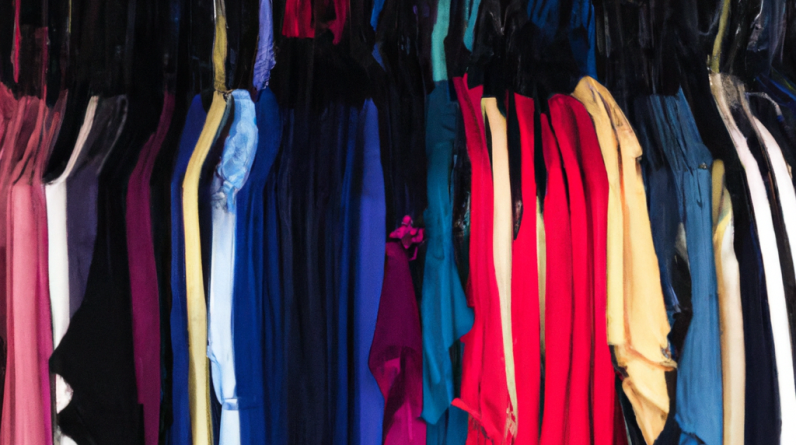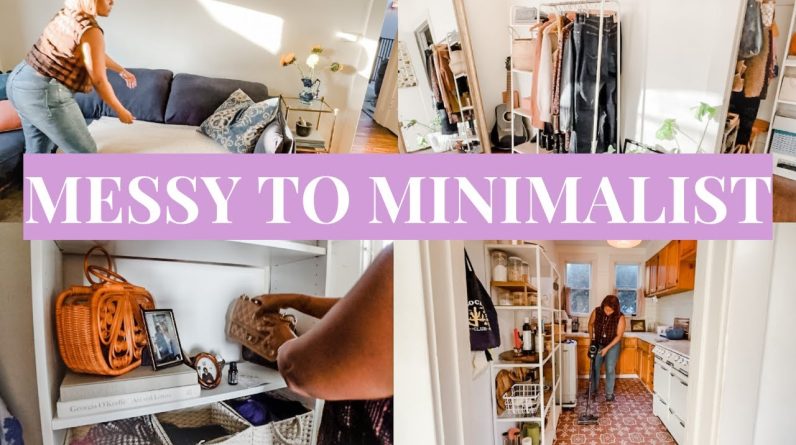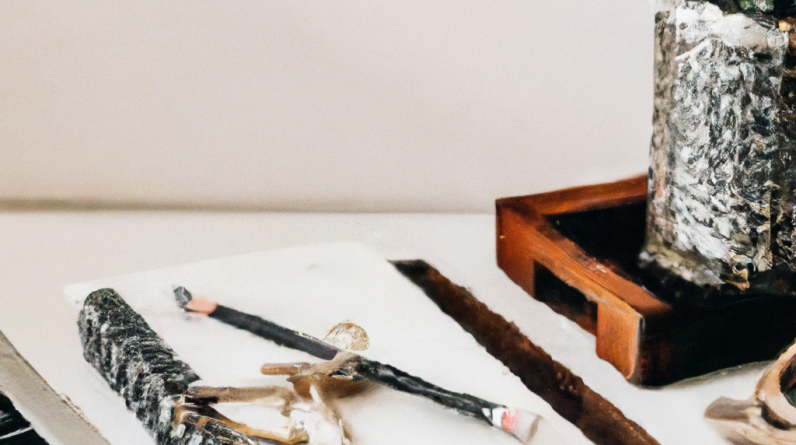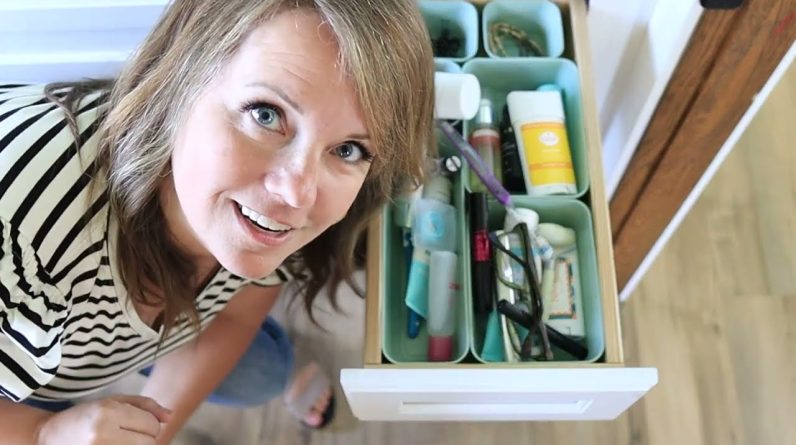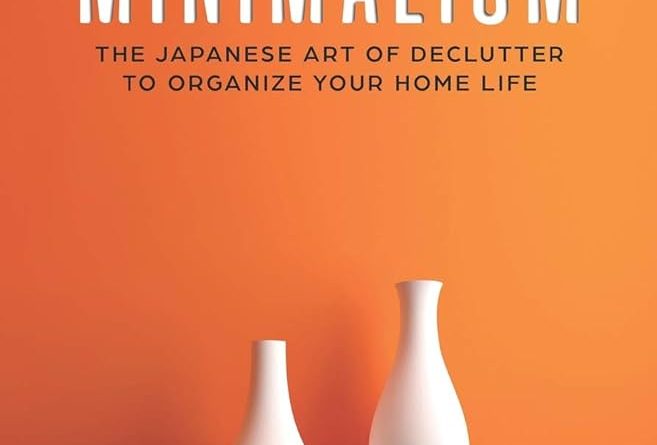
Imagine a home where every surface is clear, every room is tidy, and every possession has its place. There’s a serene simplicity that comes with extreme minimalism, a lifestyle trend that is gaining popularity around the world. It’s about stripping away the excess, getting rid of the non-essential, and only holding onto what brings you joy and purpose. In this article, we will explore the art of decluttering and how extreme minimalism can transform not only your physical space but also your mindset and overall well-being. So, get ready to embark on a journey towards a more clutter-free and fulfilling life.
Table of Contents
Benefits of Extreme Minimalism
Simplifies your life
Extreme minimalism simplifies your life by reducing the number of possessions you own and the clutter that accumulates in your living space. By intentionally keeping only the essentials, you eliminate the need to constantly organize and maintain an excess of belongings. This simplification allows you to focus your time, energy, and attention on what truly matters to you, whether it’s pursuing hobbies, spending quality time with loved ones, or focusing on personal and professional growth.
Reduces stress and anxiety
Living in a clutter-free environment has been shown to reduce stress and anxiety levels. Excessive possessions can create a sense of overwhelm and can become a constant reminder of unfinished tasks or unfulfilled responsibilities. By practicing extreme minimalism, you create a calm and serene environment that promotes relaxation and peace of mind. With fewer distractions and a clear physical space, you can better concentrate on the present moment and experience a greater sense of tranquility.
Enhances focus and productivity
When you eliminate excess possessions and distractions from your surroundings, you create an environment that fosters focus and productivity. A minimalist living space allows you to concentrate on the task at hand without the visual or mental clutter that can pull your attention elsewhere. With fewer distractions, you can channel your energy towards important tasks and goals, resulting in increased productivity and the ability to accomplish more in less time.
Instills a sense of freedom and liberation
Extreme minimalism instills a sense of freedom and liberation by detaching you from the constant cycle of consumerism and materialistic pursuits. By focusing on experiences rather than material possessions, you free yourself from the burden of accumulating material goods and chasing after the latest trends. This newfound freedom allows you to prioritize what truly matters to you, whether it’s pursuing your passions, spending time with loved ones, or exploring new opportunities. With less physical and mental clutter, you can embrace a more liberated and fulfilling life.
Key Principles of Extreme Minimalism
Embracing a 50-item rule
One key principle of extreme minimalism is embracing the 50-item rule. This rule challenges you to limit your possessions to a maximum of 50 essential items. By setting this strict constraint, you are forced to evaluate the value and necessity of each item you own. This principle encourages intentional decision-making, helping you identify what truly adds value and purpose to your life.
Adopting a one-in-one-out policy
Another principle of extreme minimalism is adopting a one-in-one-out policy. This means that for every new possession you acquire, you must let go of one existing item. This practice promotes mindful consumption and prevents the accumulation of unnecessary clutter. By adopting this policy, you carefully consider the impact of each new item on your life and ensure that your possessions remain in balance.
Questioning the necessity of each possession
Extreme minimalism encourages you to question the necessity of each possession you own. Regularly asking yourself, “Do I truly need this?” allows you to critically evaluate your belongings and prioritize what is truly essential. This principle helps you let go of items that no longer serve a purpose in your life and prevents the accumulation of unnecessary clutter.
Focusing on experiences rather than material possessions
A fundamental principle of extreme minimalism is shifting your focus from material possessions to experiences. Instead of seeking happiness and fulfillment through the acquisition of things, you prioritize the richness of your experiences and the memories you create. By valuing experiences over material possessions, you cultivate a more meaningful and fulfilling life.

This image is property of Amazon.com.
How to Start Practicing Extreme Minimalism
Assessing your current possessions
To start practicing extreme minimalism, begin by assessing your current possessions. Take the time to evaluate each item you own and consider its value, functionality, and emotional significance. This self-reflection will help you identify the items that truly bring joy and serve a purpose in your life.
Decluttering and organizing your living space
Once you have assessed your possessions, it’s time to declutter and organize your living space. Start by sorting your belongings into categories such as keep, donate, sell, or discard. Be honest with yourself and let go of items that no longer serve a purpose or bring you joy. Organize the remaining items in a way that promotes ease of use and maintains a clutter-free environment.
Creating a minimalist wardrobe
A minimalist wardrobe is an essential aspect of extreme minimalism. Evaluate your clothing and accessories, keeping only the items that you truly love and wear regularly. Focus on versatile pieces that can be mixed and matched to create various outfits. By curating a minimalist wardrobe, you simplify your daily choices and reduce decision fatigue.
Adopting a minimalist approach to technology
Technology can easily contribute to clutter and overwhelm in our lives. Adopting a minimalist approach to technology involves decluttering your digital devices, organizing your files and apps, and prioritizing the tools and platforms that truly enhance your life. Unsubscribe from unnecessary email lists, delete unused apps, and streamline your digital presence to simplify and declutter your digital life.
Simplifying your digital life
In addition to decluttering your digital devices, seek ways to simplify your digital life in general. Reduce the time spent on social media and limit your exposure to online distractions. Unsubscribe from unnecessary newsletters and notifications that bombard your inbox. By creating boundaries and eliminating digital noise, you create more mental clarity and focus.
Minimalism in Different Areas of Life
Minimalist home decor
Minimalist home decor focuses on clean lines, open spaces, and simplicity. Opt for a neutral color palette and avoid excessive ornamental details. Keep surfaces clear of unnecessary objects and choose furniture and decor pieces that serve a specific purpose. Emphasize quality over quantity when selecting items for your home, and avoid cluttering your space with unnecessary decorations or trinkets.
Minimalist travel
Minimalist travel involves packing light, being intentional with your travel plans, and appreciating the experiences rather than accumulating souvenirs. Prioritize versatile clothing items that can be mixed and matched. Choose accommodation options that align with your minimalist values, such as staying in small boutique hotels or renting apartments. Pack only the essentials and focus on immersing yourself in the local culture and experiences.
Minimalist diet and nutrition
Incorporating minimalist principles into your diet and nutrition involves simplifying your meals and focusing on whole, unprocessed foods. Emphasize quality over quantity by choosing nutrient-dense foods that nourish your body. Avoid excessive consumption of processed snacks or convenience foods. Prioritize fresh produce, lean proteins, and whole grains. By adopting a minimalist approach to your diet, you promote better health and well-being.
Minimalist work environment
A minimalist work environment reduces distractions and promotes focus and productivity. Keep your desk clutter-free by organizing your supplies and files. Choose a minimalistic design for your workspace, with clean lines and neutral colors. Eliminate unnecessary decorations or distractions that can hinder your concentration. Consider digital alternatives for documents and files to reduce physical clutter on your desk.
Minimalist relationships
Minimalist relationships revolve around quality over quantity. Focus on cultivating meaningful connections with a select few individuals who align with your values and bring positivity to your life. Prioritize quality time spent together rather than spreading yourself thin across numerous social engagements. By simplifying your relationships, you nurture deeper connections and foster a sense of authenticity and fulfillment.

This image is property of Amazon.com.
Dealing with Emotional Attachment to Possessions
Understanding the root causes of attachment
Emotional attachment to possessions often stems from deeper psychological and emotional factors. It can be helpful to explore the reasons behind your attachment to certain items. Recognize that possessions do not define your worth or identity. By understanding the root causes of attachment, you can begin to detach emotionally from your belongings.
Practicing gratitude and letting go
Practicing gratitude is a powerful tool for letting go of emotional attachments to possessions. Instead of focusing on what you are giving up, shift your perspective to appreciate what you have. Expressing gratitude for the memories or value certain possessions have brought to your life can help ease the emotional attachment and make it easier to let go.
Seeking alternative ways to preserve memories
If you find it challenging to let go of possessions due to sentimental value, consider alternative ways to preserve memories. Take photographs of sentimental items or create a memory box with small mementos that hold special significance. By actively preserving memories, you can detach from the physical object while still honoring the sentimental value it holds.
Finding joy in experiences rather than possessions
Transitioning from an attachment to possessions requires shifting your focus from acquiring things to enjoying experiences. Embrace the joy and fulfillment that come from sharing experiences with loved ones, exploring new places, or pursuing personal growth. By finding joy in experiences rather than possessions, you cultivate a sense of fulfillment that transcends materialism.
Extreme Minimalism for Better Mental Health
Reducing distractions and overwhelm
One of the main benefits of extreme minimalism in relation to mental health is its ability to reduce distractions and overwhelm. By removing physical and mental clutter from your life, you create an environment that promotes mental clarity and focus. With fewer distractions, you can better manage your thoughts and emotions, leading to improved mental well-being.
Promoting mindful living
Minimalism inherently encourages mindful living by encouraging intentional decision-making and focusing on the present moment. When you practice extreme minimalism, you become more aware of the choices you make and the impact they have on your life. This heightened awareness allows you to approach each moment with intention and gratitude, fostering a greater sense of mindfulness in everyday life.
Creating space for self-reflection and personal growth
By eliminating excess possessions and distractions, extreme minimalism creates space for self-reflection and personal growth. With fewer material and mental burdens weighing you down, you can dedicate time and energy to introspection and personal development. This self-reflection allows you to gain insight into your values, priorities, and goals, leading to personal growth and self-fulfillment.
Finding contentment in simplicity
Extreme minimalism encourages you to find contentment in simplicity and embrace a minimalist mindset. By focusing on the essentials and eliminating unnecessary clutter, you learn to appreciate the beauty and value of a simplified life. This shift in perspective allows you to find contentment in the present moment, unburdened by the constant pursuit of material possessions.
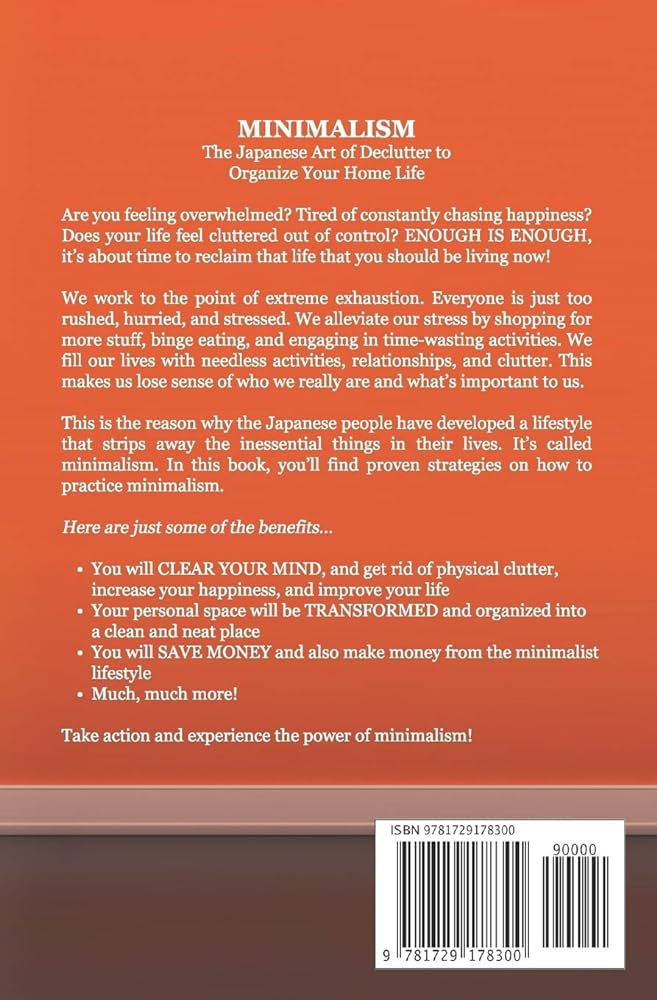
This image is property of Amazon.com.
Overcoming Challenges and Resistance
Addressing societal pressures and consumerism
Practicing extreme minimalism can be challenging in a society that often places value on material possessions and consumerism. However, it’s important to remember that your happiness and fulfillment are not determined by external factors but by the choices you make. By aligning your lifestyle with your values and priorities, you can overcome societal pressures and find contentment in a minimalist lifestyle.
Dealing with criticism and judgment
Choosing to embrace extreme minimalism may invite criticism or judgment from others who do not understand or appreciate the lifestyle. It’s important to stay true to yourself and your values, recognizing that your choices are personal and meaningful to you. Surround yourself with like-minded individuals or seek support from online communities to connect with others who share your minimalist journey.
Finding balance between minimalism and practicality
Finding a balance between minimalism and practicality is essential to ensure that your chosen lifestyle supports your everyday needs and activities. While extreme minimalism encourages a simplified approach, it’s important to strike a balance that allows you to live comfortably and practically. Adapt the principles of minimalism to suit your individual circumstances and preferences, without sacrificing functionality or convenience.
Extreme Minimalism and Sustainability
Reducing environmental impact
Extreme minimalism aligns inherently with sustainability by reducing your environmental impact. By avoiding excessive consumption and the accumulation of unnecessary possessions, you contribute to reducing resource depletion and waste production. Choosing quality over quantity, embracing sustainable practices, and practicing conscious consumption are all key aspects of extreme minimalism that promote a more sustainable lifestyle.
Avoiding excessive consumption
Consumerism and excessive consumption are detrimental to the environment and contribute to the depletion of natural resources. Extreme minimalism challenges this culture of overconsumption by encouraging mindful and intentional consumption. By curating a minimalist lifestyle, you become more aware of your purchasing habits, reducing unnecessary and wasteful consumption.
Embracing sustainable practices
In addition to reducing consumption, extreme minimalism promotes the adoption of sustainable practices. This can include reducing energy consumption, embracing eco-friendly alternatives, and prioritizing recycling and composting. By integrating sustainable practices into your minimalist lifestyle, you actively contribute to protecting the environment and fostering a more sustainable future.
Promoting a circular economy
Extreme minimalism supports the idea of a circular economy, where resources are used efficiently and waste is minimized. By embracing second-hand options, repairing items instead of discarding them, and utilizing shared resources or rental services, you actively participate in creating a more sustainable and circular economy. These practices reduce waste and promote the efficient use of resources.

This image is property of i.ytimg.com.
Minimalism as a Lifestyle Choice
Embracing the concept of ‘enough’
Minimalism as a lifestyle choice involves embracing the concept of ‘enough.’ It challenges the notion that more possessions or wealth equate to greater happiness or fulfillment. By defining what is enough for you personally, you detach yourself from the constant pursuit of more and shift your focus towards contentment and fulfillment in the present moment.
Defining personal values and priorities
To fully embrace minimalism as a lifestyle choice, it’s important to define your personal values and priorities. Understanding what truly matters to you allows you to align your lifestyle with these values and make intentional decisions that support your overall well-being. By prioritizing what is truly important, you create a life that is in harmony with your values and brings you joy.
Focusing on intentional living
Intentional living is at the core of minimalism as a lifestyle choice. Rather than passively allowing life to happen to you, intentional living involves making conscious choices and actively shaping your experiences. By eliminating distractions and unnecessary possessions, you create space and clarity to live a life guided by intention and purpose.
Discovering what truly brings joy and fulfillment
Minimalism as a lifestyle choice provides the opportunity to discover what truly brings joy and fulfillment to your life. By stripping away the excess and focusing on what truly matters, you gain a deeper understanding of your values and preferences. This self-discovery allows you to cultivate a life that reflects your true desires and brings you lasting happiness and fulfillment.
Embracing the Journey of Extreme Minimalism
Learning from others’ experiences
Embracing the journey of extreme minimalism involves learning from the experiences of others who have already embarked on this path. Seek inspiration from books, blogs, podcasts, or documentaries that share stories and insights from minimalists. By learning from those who have already navigated the challenges and reaped the benefits of extreme minimalism, you can gain valuable knowledge and guidance on your own journey.
Accepting imperfection and setbacks
The journey of extreme minimalism is not linear, and it’s important to accept imperfection and setbacks along the way. Realize that it’s normal to encounter challenges or experience moments of temptation to accumulate possessions. Embrace the process of learning and growing, and recognize that setbacks offer valuable opportunities for self-reflection and reassessment of your priorities.
Continuously evolving and adapting
As you continue your journey of extreme minimalism, be open to continuously evolving and adapting your approach. Your values, circumstances, and preferences may change over time, and it’s important to embrace these changes and adjust your minimalist lifestyle accordingly. Stay true to your core values, but remain flexible and open to new ways of incorporating extreme minimalism into your life.
The long-term impact on your life
Embracing extreme minimalism can have a profound and long-term impact on your life. As you simplify and declutter, you create space for personal growth, improved focus, and enhanced well-being. By aligning your lifestyle with your values and priorities, you foster a sense of authenticity and fulfillment. The long-term impact of extreme minimalism is a life characterized by simplicity, intentionality, and contentment.

This image is property of i.ytimg.com.




